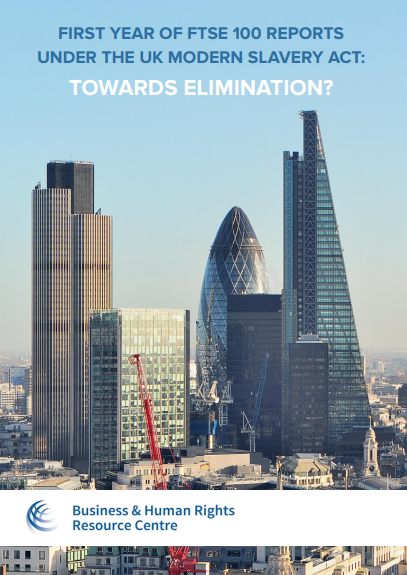The International Labour Organization estimates that illicit profits from modern slavery reach $150 billion a year. In 2016, 16 million people were victims of forced labour in the private economy. Companies are exposed to modern slavery risks through their own operations and through complex supply chains where manufacturing, sourcing, financing and hiring are outsourced. Risks are particularly high further down the supply chain.
The UK Modern Slavery Act (the Act) recognises that every large company has these risks, and requires all companies with an annual turnover of at least £36 million and operating in the UK to report on the action they are taking to ensure modern slavery does not take place in their operations and supply chains. The UK government suggests companies cover six reporting areas in their reports: organizational and supply chain structure, company policies, due diligence processes, risk assessments, effectiveness of measures in place and training (the reporting areas).
This report by the Business & Human Rights Resource Centre assesses the action reported by the FTSE 100, the UK’s largest listed companies. Findings show there is a welcome cluster of leading companies taking robust action, such as Marks & Spencer, Sainsbury (J) and Unilever, while the majority show a lacklustre response to the Act at best.
Since producing the report, the authors have received updates and clarifications from some companies. These are detailed here.
Key recommendations
Companies should
- Ensure corporate executives prioritise modern slavery as part of the strategic agenda of the company and support all departments implementing relevant policies and strategies.
- Cooperate with their peers to investigate modern slavery risks common supply chains through deep-dive research, and share insights to help develop best practice.
- Raise awareness among their suppliers of modern slavery risks and require them to conduct due diligence in their operations and supply chains.
Investors should
Engage with companies on their actions to tackle modern slavery and reward companies that demonstrate due diligence to avoid slavery and provide remedy. More information is available in CORE Coalition’s briefing, Engaging with Companies on Modern Slavery – A Briefing for Investors.
UK Government should
- Improve the monitoring and enforcement mechanisms to ensure companies that are required to report under the Act feel pressure to comply and are penalised if they fail to do so.
- Publish a list of the companies required to produce statements under the Act and support open, free, and accessible information regarding company compliance;
- Provide clear incentives for corporate action: bids for public contracts should be dependent on companies demonstrating due diligence in their operations and their modern slavery statements.

